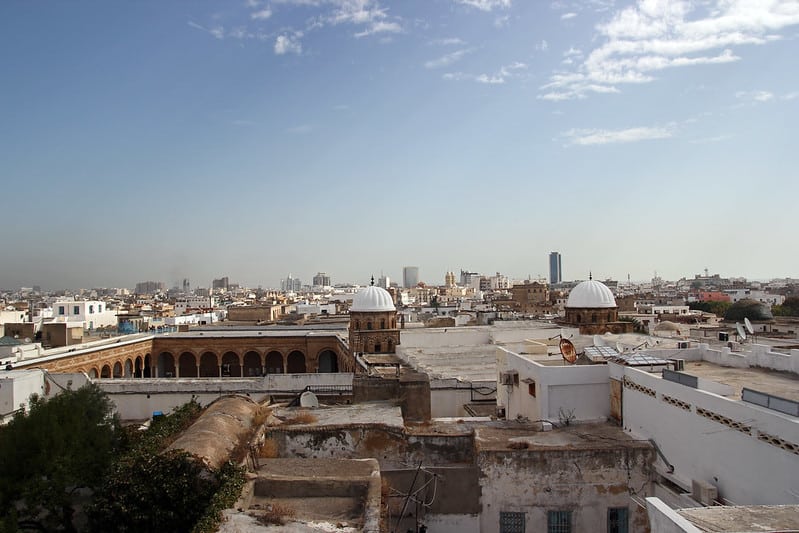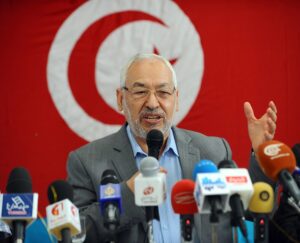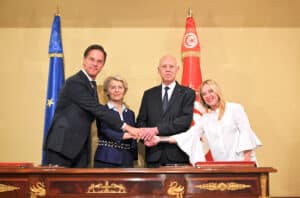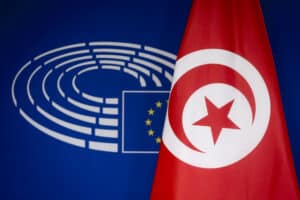In a latest sign of democratic backsliding, Tunisia’s President Kais Saied has sacked 57 judges – blaming them of “obstructing the functioning of justice”. It is regarded as a new low towards critical moments on Saied’s 2022 political roadmap for Tunisia. On July 25, Tunisia will organize a referendum on changing the constitution which will be followed up by general elections in December this year. Since Saied’s power grab last-July, where he sacked the government and commenced ruling by decree, there have been deep worries over the survival of Tunisia’s young democracy.
A new step towards authoritarianism
Earlier this year, Saied had also replaced Tunisia’s Supreme Judicial Council – a key body in the country’s post-Arab Spring political set-up. This time, Saied dismissed the judges by decree, a blatant interference in Tunisia’s judiciary. He said in a televised address that he had “given opportunity after opportunity and warning after warning to the judiciary to purify itself.” In addition, he listed a series of accusation against the judges, from corruption, aiding terrorism, and even sexual harassment.
In reaction, dozens of lawyers and activists gathered near Tunis’ Palace of Justice. Since June 6, all courtrooms are closed. Anas Hamadi, president of the Association of Tunisian Magistrates, stated that 99% of Tunisia’s judged participated in a week-long strike. Currently, Tunisia’s judiciary has stopped working, having major consequences in society.
Saied’s roadmap
In December 2021, Saied’s administration published a roadmap for Tunisia’s political future. It included an online public consultation tool on its constitution, and a subsequent commission to formulate suggested constitutional amendments. This will be followed up by the July 25 referendum, and finally in December, elections under a new electoral law. From the start, the process has been marred by anomalies. The online tool was untransparent, as is the constitutional commission that is elected by Saied himself. Furthermore, Saied also took power of the country’s election monitoring institutions and refuses to allow foreign election observers. The July referendum can therefore not be perceived as competitive or trustworthy, and is expected to add to the process of democratic backsliding in Tunisia.
International actors
Saied’s roadmap rather seems to be resembling a laid-out path to authoritarianism instead of democratic reform. In the tradition of other countries in the region such as Egypt, his administration stifles political opposition, activism, and free media. Above all, he has completely blurred the separation of powers that was established under Tunisia’s post-2011 constitution.
Saied has some powerful allies – not unexpectedly Gulf States, such as Saudi Arabia, the UAE, but also Egypt. These favor an authoritarian Tunisia that aligns with them on various regional issues – the repression of Islamist political tendencies in the region and the Libyan civil war among others.
Western international actors are not completely out of the picture – but the window for salvaging Tunisia’s 2011 gains has become very small. The U.S. has already said to cut millions in funding if Saied keeps pursuing his current policies. Analysts have already warned that this could only exacerbate problems as this would hit Tunisia’s civil society hard. Bottomline, Tunisia remains in dire need of economic support. The country is drowning in debt, had defected on the re-payment of bonds and is close to all-out bankruptcy. The inflating food prices due to the war in Ukraine will only further exacerbate these dire problems. In this regard, western actors have much to offer. In current, dire times, these are difficult decisions to make – but the value of Tunisia as a democratic outlier in the MENA region is unmistaken and is worth fighting for.
Sources: Brookings Carnegie Foreign Policy AP I AP II
Photo: Flickr



